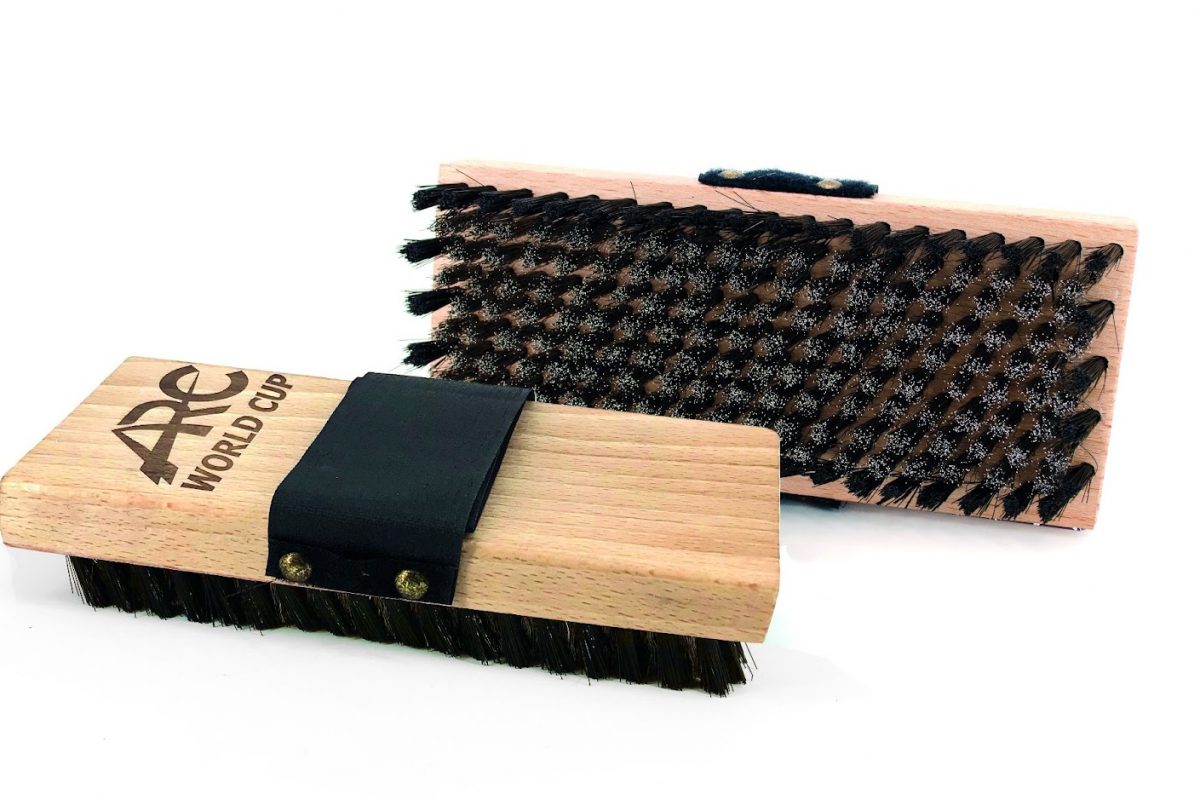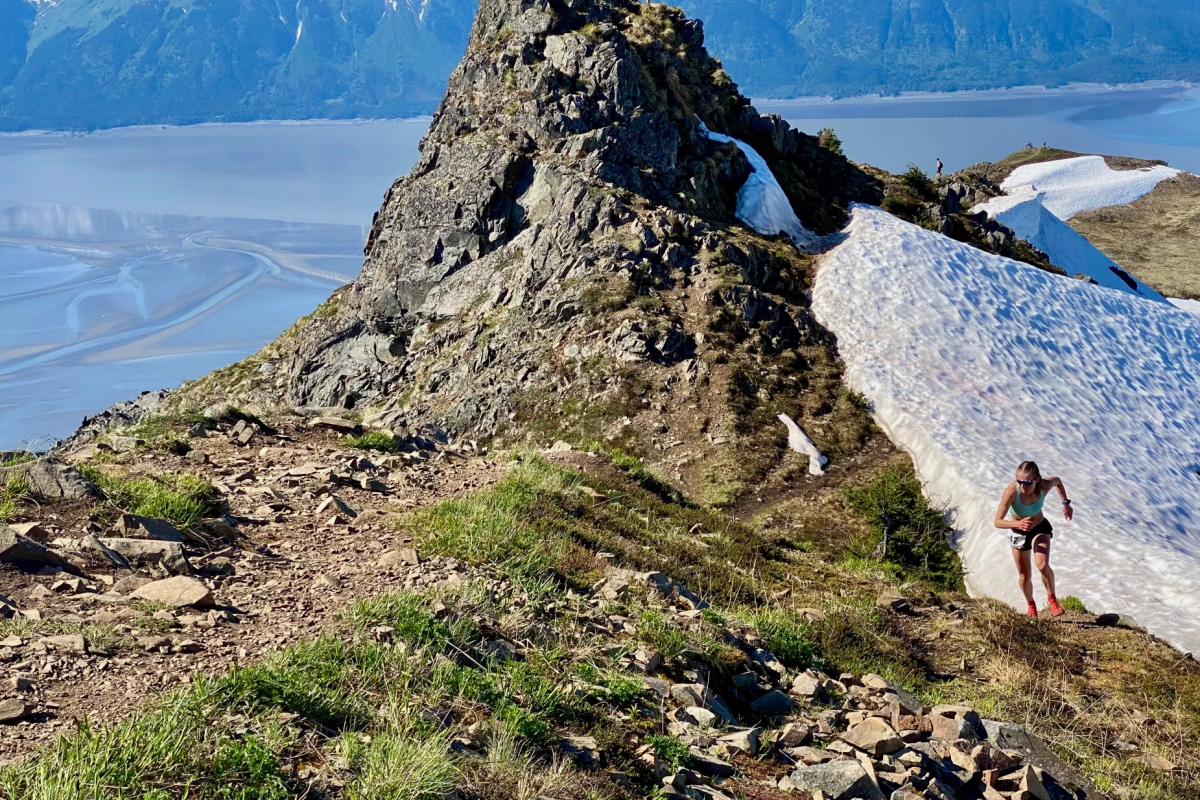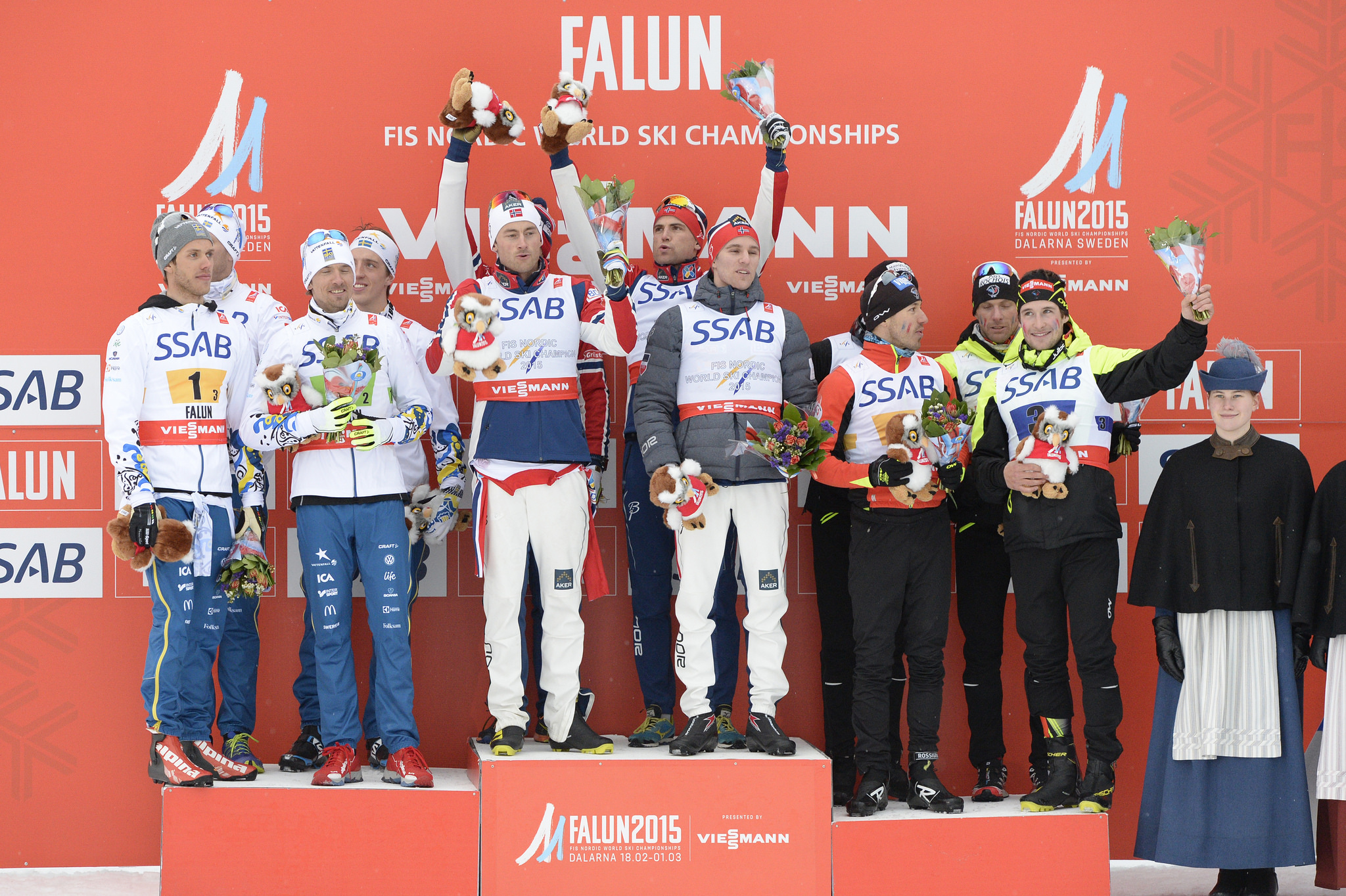
FasterSkier’s coverage of the 2015 FIS Nordic World Ski Championships in Falun, Sweden, is brought to you by the generous support of L.L. Bean, now featuring a complete line of Kikkan Randall training wear.
FALUN, Sweden– When the French men’s ski team won bronze in the relay at the Olympic Games in Sochi, Russia, last year, they made history. Never before had the French made the relay podium in a championship event, and team members Jean-Marc Gaillard and Maurice Manificat said they were crying from joy.
But that medal came with a caveat: Norway, despite being heavy favorites, famously missed the wax for large portion of the Sochi Games. And so, once the event was over, the French cross-country skiers vowed to do it again, and this time with no asterisk.
“We were thinking about it since last spring,” Gaillard told FasterSkier at the finish of today’s World Championships 4 x 10 k relay in Falun, Sweden. “We knew that the Norwegians had not so good skis in Sochi and we were a little bit lucky. So we were just thinking about how to have a medal in Falun, but in a regular race.”
French dreams came true today when the team of Gaillard, Manificat, Robin Duvillard, and Adrien Backcheider repeated in bronze – with Norway at the top of the podium and Sweden second.
The French were closer to first place (just 8.9 seconds) than they were to fourth. It was a clear, decisive accomplishment for a team with just a fraction of the resources of the Swedes, Norwegians, or fourth-place Russians, and from a country where cross-country skiing is hardly a popular pastime.
“In the finish we had a medal, and that was a very great thing for the French ski team,” said 22-year-old anchor Backscheider. “It’s a dream.”
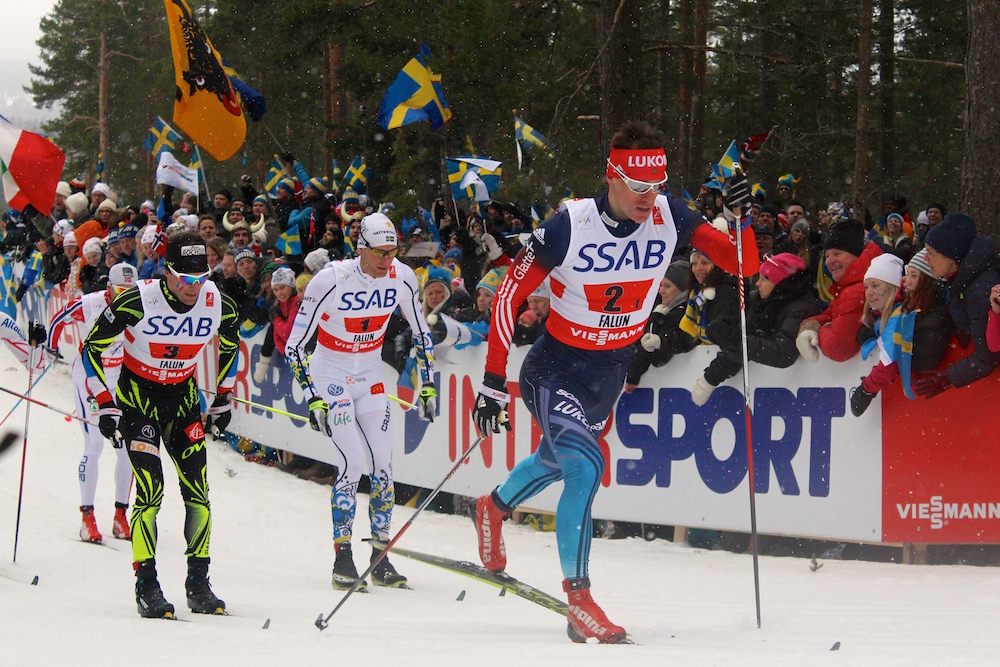
It was a true team effort, with all four skiers contributing to the overall result. Gaillard had the weakest leg – “not the best race in my career” – and tagged off in ninth, 21.2 seconds behind Alex Harvey of Canada.
But after that, Manificat, the silver medalist from the 15 k skate earlier in the Championships, set to work.
Following along with Johan Olsson of Sweden, Manificat first caught the lead pack. Then, as Olsson put in an incredible push and fractured the group, Manificat tried to go behind him. He wasn’t able to hold onto the Swede, but entered the exchange zone more than seven seconds clear of third-place Norway. Next to Olsson, Manificat had the second-fastest split time for his leg.
By that time, Robin Duvillard was thinking that the podium was definitely attainable. Rather than focus on Norway or Sweden, he tried to extend the gap to the Russians, who were skiing in fourth place. By putting in his time pulling the lead trio (Duvillard caught Marcus Hellner of Sweden, and then the pair was caught by Norway’s Anders Glöersen), he was able to put another eight seconds into the Russian team and come one step closer to securing a podium spot.
“Maurice did a great job in the second lap, and for me it was – it was not to think, I had to just follow Marcus and it was just amazing,” Duvillard said. “Then I tried to push and make the gap bigger to the Russians. We were just here to take medals, we didn’t care if it’s gold, silver, or bronze. And the last one [Backscheider] is young. I took responsibility, and it was good because the Russians pushed really hard on the first two loops.”
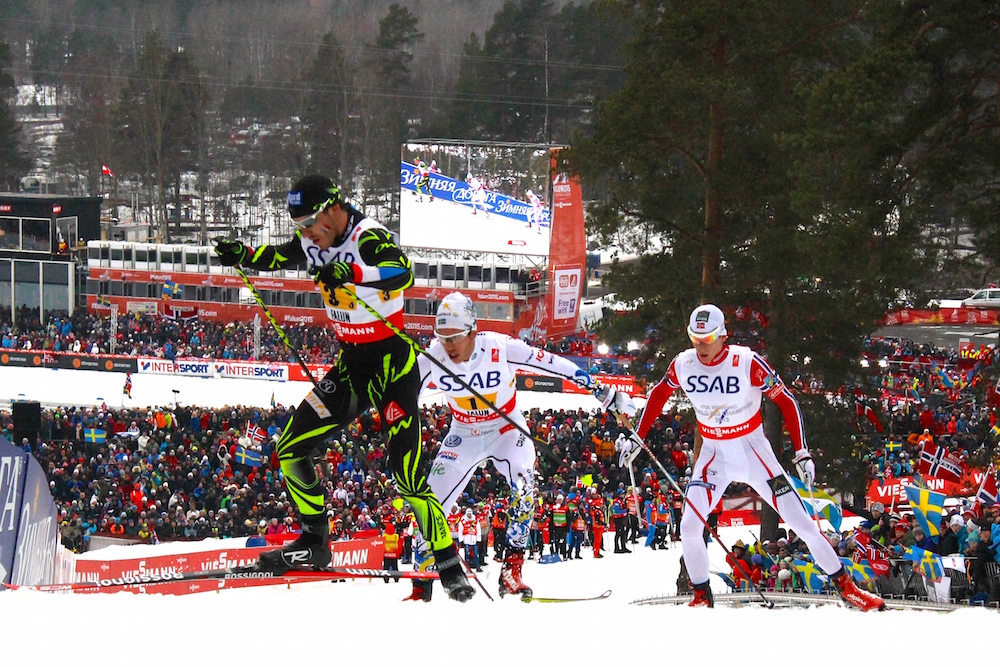
Backscheider took the tag in second place, just ahead of Norway. He had recently returned from Kazakhstan, where he placed third in the 15 k skate at Under-23 World Championships, and had also turned in an admirable 19th-place finish in the World Championships 30 k skiathlon.
But skiing with the Norwegian and Swedish anchors, Petter Northug and Calle Halfvarsson, was another story. Nobody was quite sure what he could do.
Backscheider skied like a pro, however, and stuck with the superstars until the very finish. In fact, at times he pushed the pace and even began to drop them.
“I couldn’t stop because the Russian guy would come,” he said. “I tested the other guys, Northug and Halfvarsson. But they were very strong. I have to have more experience at the final sprint to compete there.”
In the end it was bronze for France, 8.9 seconds behind Norway. They were far from disappointed not to win gold. Their goal was a medal, no matter what color.
“Today it happened, and it’s just unbelievable,” said Gaillard, still ebullient from the team’s success.
“We knew that we were in good shape,” Duvillard said. “But in the relay, many things can happen. You can break a pole, fall, or have not good skis, or just find some team better than us.”
Despite wearing bib three as the Olympic bronze medalists, Duvillard asserted that there was no external pressure for the team to medal.
“We only took one medal in our history,” he said. “For us we are not here to defend something.”
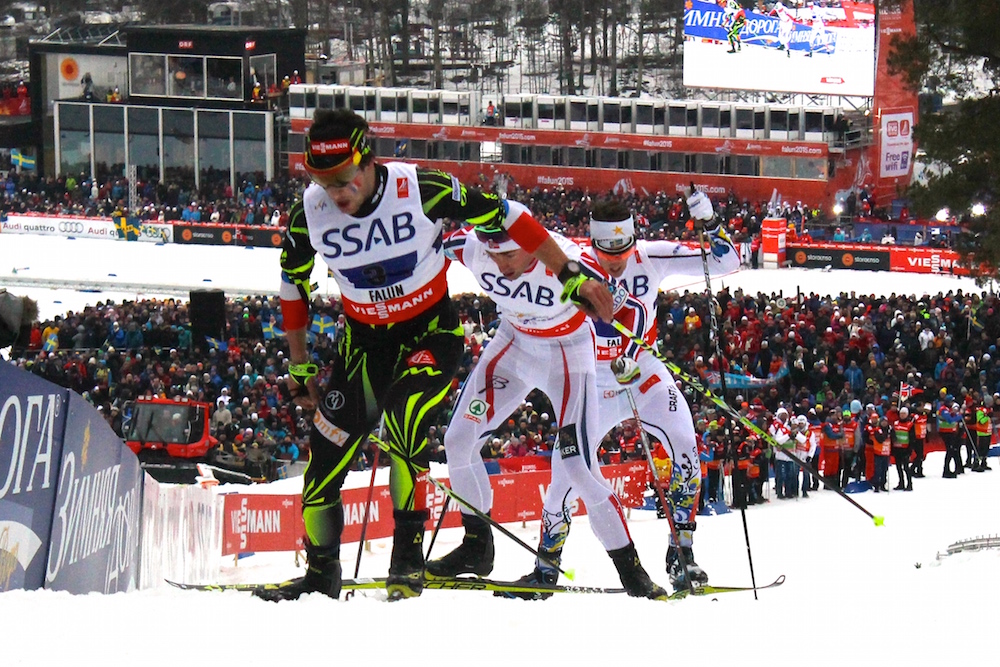
That might be because, despite the recent success of the French team and the earlier success of stars such as Vincent Vittoz, cross-country skiing doesn’t get much press in France.
“Don’t worry, it changes nothing,” Gaillard laughed about the result. “That’s not the biggest sport for sure in France. It’s maybe the 25th sport. Maybe we have some place in the newspaper tomorrow. But a little one.”
The oldest member of the team at 34 years of age, Gaillard has put in his time on the World Cup circuit since 2002. And he has found success – individual podiums in Canada, Russia, Italy, and the Czech Republic, as well as relay podiums starting in Davos, Switzerland, in 2007.
But doing it at a championships event, with a team, is something special.
“It’s not that I deserve it, but I can feel that I know what is a medal and what is a good result,” he said. “If you are 20 years old when you get some medal, you think it’s easy and everything is possible. But when you don’t get a medal until you’re 44 years old, you can appreciate it. Really, it was a good idea to continue my career after the age of 30!
“With the team it’s more fun,” he continued. “When you have a medal individually, you can’t share with everybody because for sure you have some guy on the team who is disappointed about the race. When it’s a relay, it’s crazy because everybody is happy. You can really share it with the team.”
The men might get a few accolades back in France, but that’s not why he races, Gaillard said.
“The most important is to have fun with the team, and get the best results we can have,” he explained. “We can move mountains, sometimes even when you don’t have much support of your country. I think we have a good spirit in the team and I’m sure we train as much as the other ones. We have good conditions for training in France, nice mountains, everything. We just don’t have the money that the other teams have. So it really shows that everything can happen, even if you are not in the really strong country.”
Stay tuned for a complete international report and detailed reports on North American results.
— Lander Karath contributed reporting.
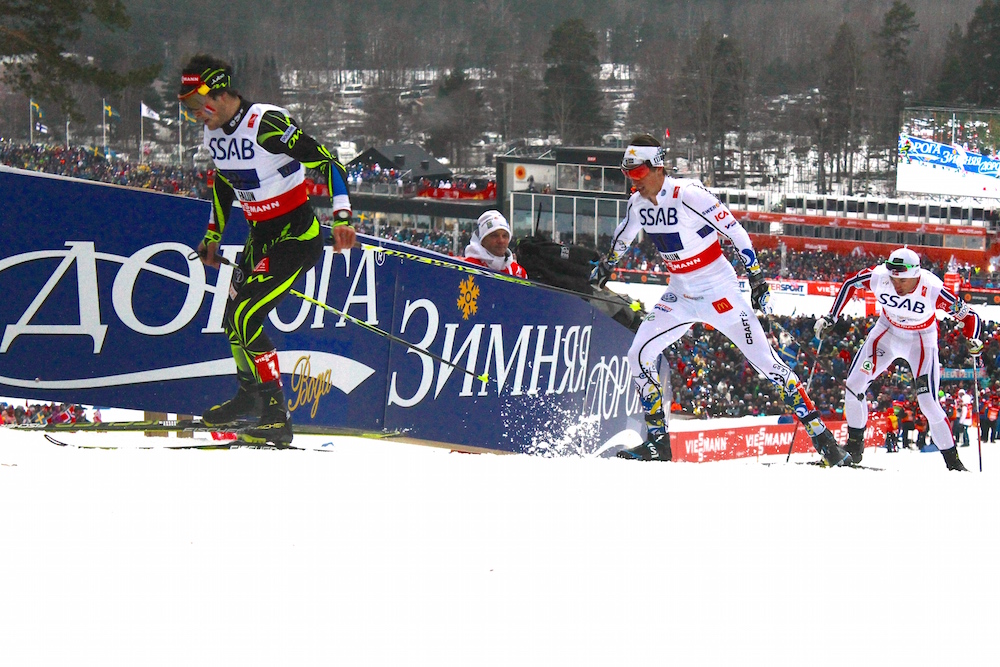
Chelsea Little
Chelsea Little is FasterSkier's Editor-At-Large. A former racer at Ford Sayre, Dartmouth College and the Craftsbury Green Racing Project, she is a PhD candidate in aquatic ecology in the @Altermatt_lab at Eawag, the Swiss Federal Institute of Aquatic Science and Technology in Zurich, Switzerland. You can follow her on twitter @ChelskiLittle.

